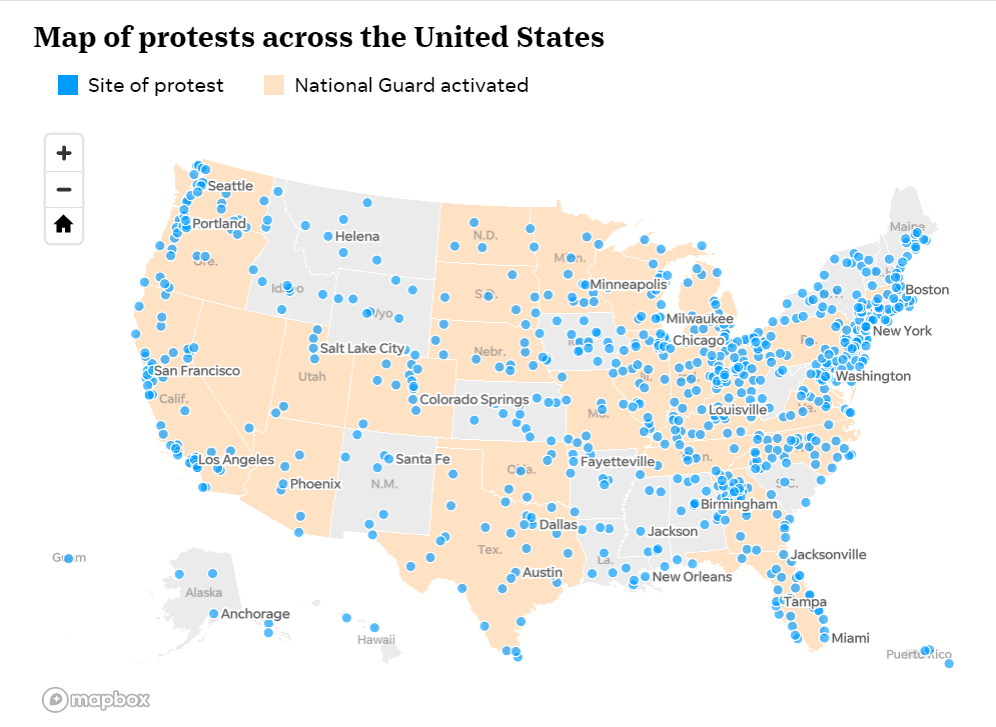|
In a relatively short time, American society has gone from a people trying our best not to spread COVID-19 to a nation in shock over the horrific encounter of Derek Chauvin and George Floyd. Many acknowledge that the situation was brewing beneath the surface for some time, and the scene in Minneapolis simply was the match that ignited what we have now. Regardless of your political views or even your views on systemic racism, the US is not close to a revolution - we are there. Look at some facts. The map below (USA Today) shows cities and towns which have had protests (peaceful or not) and states where the National Guard has been activated. Various places throughout the country are seriously considering dismantling their police forces, with New York City having already diverted funds away from its own NYPD. It does not feel to me like this current crisis will blow over (and I'm not saying it should or shouldn't). Ordinarily, these things, when on this scale, end either with a dictator crushing the rebellion or an overhaul of the way a society is constituted and governed. As a spiritual leader shepherding your congregation during a revolution, here are some reminders and encouragements. There truly has never been a better time to be a pastor, because we have the answers for which so many are genuinely searching.
0 Comments
By now, it should be universally accepted that no one can know precisely when churches will be permitted to reopen their doors to groups of more than 10 people. Critics may criticize for any number of reasons, but this should not be one of them. Also, even with the uniqueness of the COVID-19 situation, any time we deal with uncertainty on this scale, we do well to prepare for as many different scenarios as possible. That said, I am grateful for the work others have done to forecast trends and ideas of where the Church may be post-coronavirus. Having done some of my own research, I'd like to add a few thoughts for church leaders to consider.
The 80% rule (or 70% rule) will probably become the 50% rule (not the 60% rule). You understand your worship space feels full at about 70-80% capacity. Some predict that post-coronavirus this percentage will fall to 60%. Based on researching policies at AMC Theaters and Regal Cinemas and others, 50% appears more likely. This has implications for churches who are designing buildings. If we build what we had previously designed, we will basically lose 60 usable seats if 50% is the new normal. It also has implications for mobile churches. Depending on how your rental agreements are structured, you may have to rent more ballrooms, or more classrooms, and this could drive up your costs. "Public Health Officials" hold the trigger. Not much is said about how we will know when we can resume gatherings, probably because we are at the mercy of the government. The NBA, NHL, and other entities identify "public health officials" as having sole authority about when things reopen. For churches, this is significant, because we appear to have mixed feelings as to our level of willingness to comply with what these officials hand down. Let us factor in the reality that these officials are not just cancelling public worship, but also any gathering of any real size. This is a good talking point for conversations with members. It is essentially out of our hands. People will give toward this but not that. Some are postulating how giving will be affected by COVID-19, just in broad terms of how much it will decrease. Admitting that none of us know anything about the future here for sure, it feels that giving could hold steady, decrease less than expected, or even increase depending on priorities. Layoffs, reduced hours, and basically having less residual income will change things. It feels like people will likely prioritize ministry (difference-making) with immediate fruit, community involvement, personnel (who are making a difference, loving, and serving), missions, and technology over brick-and-mortar, utilities, property upkeep, and so on. This will have budgeting implications. I will save my other thoughts on future trends for a later post. Hope this helps! If you have a sense of where things are going for churches after COVID-19, please feel free to share it in the comments.  One gift Sir Isaac Newton gave the world was his Law of Inertia (sometimes called Newton's First Law or Law of Motion) - namely that objects at rest tend to stay at rest and objects in motion tend to stay in motion (unless acted upon by an unbalanced force). When it comes to church attendance, it was challenging to get people to come to church before the Coronavirus disease. Our church would have 63% of its "active members" in public worship any given week; but it was a different 63% every week. We found that the national trend of people attending 1-2 times per month was true in our church. That was before the virus. Now that we have been unable to gather for two consecutive Sundays, anticipating at least a third, what will that mean for us coming back together? As church leaders, we need to be prepared to lead from the expectation that Newton's Law of Inertia applies here. If we do not initiate an outside force acting upon our people, then those who are no longer in motion (i.e. they no longer attend) will continue not being in motion, even after we are cleared to resume public gatherings. What should that "outside force" be? Here are some ideas.
I will pray for you and your church as you put together intentional plans for coming back together. If you come across an idea for keeping everyone together that seems helpful, please put it in the comments below. Now is not the most comforting time to be a senior adult anywhere in the world. We are painfully aware that the elderly are vulnerable to the Covid-19 sickness - not only to become infected but also to have negative outcomes. That said, we who are not yet in our golden years have the opportunity to reassure the elderly of our concern through biblical truth and Christian love.
Those Who Despair of Living At times, those who are advanced in age despair of living and even think fondly of a disease that might lead them, at long last, to their eternal home. I have had some who felt this way in my first church, and I have encountered this thinking as recently as the past 72 hours with regard to the Coronavirus. Here are some biblical truths to help reassure these folks:
Some have said they believe the Coronavirus was lab-created for the purpose of taking out the elderly. I have heard this. Others say that they are disturbed by the younger generations taking a "not my problem" approach to the situation. Whether conspiratorial or not, elderly people who feel threatened by the Covid-19 pandemic need our love and concern. We are to honor our fathers and our mothers. We are to love our neighbors as ourselves. Understand this also, one day, you may be 70, 80, or 90. What level of attention and love would you like to receive? Sow those seeds today that you may reap them when it is your turn. Do you have your own ideas of how we can reassure the elderly in this difficult time? Please drop a comment below. Thank you! When a loved one passes, the manner in which we honor and remember that loved one is moving away from traditional funeral proceedings. At first, I saw these new gatherings as very fitting exceptions to the rule, but this year, three out of four memorials in my ministry have followed this new trend. And while there are certainly financial reasons for this shift, I truly believe the primary reason is emotional health. Without exception, grieving families in my ministry all state that they do not want the remembrance to be a sad occasion. Referring to the deceased, "So-and-so wouldn't want that." So, what is this new trend?
|
AuthorPastor Billy Shaw is a full-time pastor, husband, and father with a passion for helping other pastors. Archives
August 2020
Categories
All
|

 RSS Feed
RSS Feed